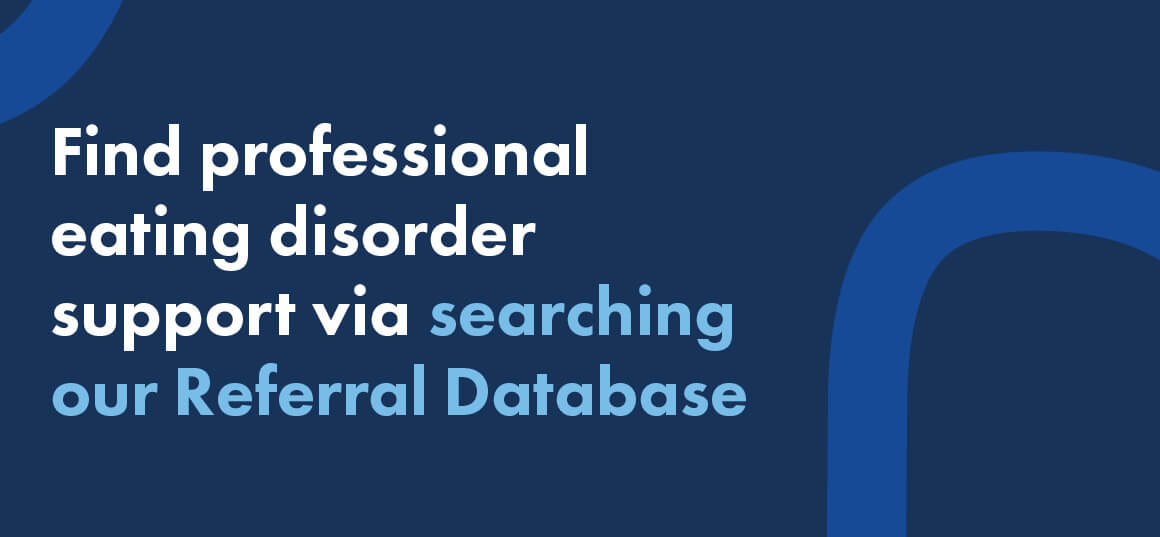#2 Why people binge and tips to help
Welcome to the Bulimia Nervosa and Binge Eating Disorder self-help series {#2 of 5}
Whatever your age, gender or cultural environment, Binge Eating Disorder (BED) and Bulimia Nervosa (BN) can happen to anyone. Whether you have a diagnosis for binge eating or bulimia, or feel you might be experiencing some form of disordered eating, understanding yourself and your relationship with food can be empowering. In this self-help blog we’ll discuss binge eating, some common triggers and share ways that can support you in your recovery journey.
What is Binge Eating Disorder (BED)?
Binge Eating Disorder (BED) is a characterised by regular episodes of binge eating. Binge eating means eating a very large amount of food, in a short period of time, with a sense of being out of control, or unable to stop. You may feel numb, or feel disconnected from your body while eating, not fully tasting or experiencing the food.
You may have Binge Eating Disorder (BED) if you:
- Frequently consume large amounts of food in a short period of time
- Often eat very quickly, without being hungry and continue to eat when already full, to the point of discomfort
- Experience feelings of guilt and shame after a binging episode
- Are secretive about your behaviour around food, such as eating alone
It’s important to be kind to yourself. The most important thing to understand about binge eating is that it’s often an unhelpful coping tool used to help with challenging emotions like stress, anger, boredom or distress.
You can learn more about Binge Eating Disorder (BED) and binge eating here.
What is Bulimia Nervosa (BN)?
Bulimia nervosa is when you have repeated episodes of binge eating followed by actions that you mistakenly believe will make up for the binge. You may place an excessive emphasis on your body shape or weight, and this can lead to your self-esteem and self-worth being defined by the way you look.
The two key features of bulimia nervosa are:
- Eating a very large amount of food within a relatively short period of time (e.g. within two hours)
- Feeling a sense of loss of control while eating (e.g. feeling unable to stop yourself from eating)
A person with Bulimia can become lost in a dangerous cycle of eating out of control and attempts to make up for it, which can lead to feelings of shame, guilt and disgust. Over time these behaviours can become more compulsive and uncontrollable.
You can learn more about bulimia nervosa here.
What’s the difference between Binge Eating Disorder (BED) and Bulimia Nervosa (BN)?
The short answer is what health professionals call compensatory behaviour.
In cases of Binge Eating Disorder (BED) there is no compensatory behaviour. Whereas people who have Bulimia will attempt to compensate, or ‘make up’, for their binge eating.
Compensatory behaviour and may include:
- Self-induced vomiting
- The use of laxatives and diuretics
- Excessive exercise
Why is compensatory behaviour so harmful?
Attempts to ‘make up’ or compensate for a binge eating episode can put you on an extremely distressing merry-go-round. There are often strong feelings of guilt and shame and it can be very hard for a person to gain control and stop using compensatory behaviour.
This cycle is extremely harmful.
Firstly, your body is extremely efficient at absorbing calories and nutrients in food, beginning in your mouth and oesophagus as soon as you start to eat. Even if you were to vomit everything immediately, you would still absorb up to about 75% of the calories.
Vomiting also causes damage to your teeth, mouth, throat and stomach.
Laxatives and diuretics also can’t stop the absorption of calories and nutrients. In fact, by the time what’s left of the food is expelled, your body has absorbed almost all of the calories and nutrients.
Overusing laxatives and diuretics can result in the loss of bowel muscle tone, bloating, gas, colicky pain, appearance of mucus and blood in the stool, incontinence (lack of control over urine leaks) and dependence (where your colon loses its natural ability to contract). It’s super important to tell your doctor if you plan on reducing or stopping laxative use as you’ll need medical supervision.
Too much exercise along with restricted food intake, can actually lower your metabolism. This helps your body retain the energy from the food consumed, and actually acts to prevent further weight loss. And overexercising actually breaks down muscle fiber, not fat.
Binge eating or purging is dangerous, but it can be extremely hard to stop.
Help! Why is it so hard to get off the binge and purge merry-go-round?
Once a person starts bingeing and purging it can be very hard to stop, which is why we encourage people to get in touch with our Helpline and get support. But it’s important to know, even with support, recovery can take time – there’ll be many instances where you’ll feel like you’re taking two steps forward and one step back, and it’s totally normal.
Finding freedom from the binge and purge merry-go-round is challenging, some reasons may include:
- It’s hard to make wise food choices: When you binge and then limit or restrict your eating it can be hard to listen to your body’s natural cues of hunger, which makes rational choices around eating difficult.
- Feeling like a failure: Labeling some foods as “good” or “bad” means you might feel like you’ve ‘failed’ when you eat a food you consider “bad”, or if you have eaten a lot of food.
- What you resist persists: Bingeing as a way of coping with strong thoughts, feelings or avoidance only covers up feelings of sadness, loneliness, anger or fear. It doesn’t actually address them. And until you look at those uncomfortable feelings it will be hard to find freedom from them.
- Lifelong habits: Unhelpful habits, that have gone on for years and are triggered by a time or place usually means the behaviour is automatic.
- The way our brains work: Different area of your brain become activated when you use food as a reward. While the science here is still young, it is comforting to know that you have the power to change the way your brain works.
While the above list can seem a little overwhelming, or even disheartening, it’s important to understand that recovery isn’t merely about willpower, quick fixes or a personal failing. Recovery is more complex and requires careful planning, support and often treatment.
What can I do the next time I want to binge?
The following is an exercise, which you may find useful in helping to bring you greater awareness around yourself and why you might be binging.
The purpose isn’t to stop the binge, although that may happen. This exercise is about accessing your mental state before you might binge and to see if you can get any clues as to why binge eating is in your life.
Step 1. Firstly, congratulate yourself for having the awareness to recognise you want to binge. That is a big step forward.
Step 2. Grab yourself a pen and paper.
Step 3. Set a timer for 5 or 10 minutes. (You can use the one on your smart phone.)
Step 4. Take a few deep breathes. Focusing on both your inhale and exhale.
Step 5. Ask yourself: “What am I feeling?” listen to your inner sense of wisdom and write down what it says.
Step 6. Then ask yourself: “What happened right before I wanted to binge?” and write down the answer.
Step 7. Ask yourself: “What do I really want and need right now?”
Step 8. “Can I give myself that in a way which doesn’t cause me harm?”
Step 9. Thank yourself for taking the time to check in.
You might find the exercise difficult or scary. You might even forget to give it a go and that’s ok. Don’t give up and remember you can always try again next time. It’s about practice and persistence.
And you can always contact our Helpline and get support as you work through the questions. Butterfly Foundation’s National Helpline can give you free information, referrals and brief counselling. We’re open from 8am – midnight AEST, seven days a week, and you can chat via phone, webchat or email.
Are you ready to get started?
Download your worksheet and get started now.
A final thought
If you think you might have an eating disorder, it’s important to talk to your doctor, as there are many physical complications that can occur from having an eating disorder. Get in touch with our team and we can connect you with a professional who has experience in eating disorders.
If you liked this article please share
Next blog in this series
Not sure if you really want to recover from your eating disorder? That’s totally normal. {#3 of 5}
Do you want to learn more?
The caring team at the Butterfly Foundation are here to help answer questions. Call our friendly National Helpline team on 1800 33 4673, or connect with via webchat or email.
If you need urgent assistance or support, please ring Lifeline on 13 11 14.




















